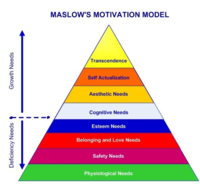
Photo from wikipedia
Purpose Grounded in the socio-emotional selectivity theory, the purpose of this paper is to develop a people recommender and social matching system that better serves the information needs of older… Click to show full abstract
Purpose Grounded in the socio-emotional selectivity theory, the purpose of this paper is to develop a people recommender and social matching system that better serves the information needs of older people on social networking sites or services (SNSs). Design/methodology/approach The paper uses systems development as a design science research methodology to construct a conceptual framework and then design and prototype a recommender system. Findings The research demonstrates that it is possible to exploit Google Maps-based interfaces, coupled with historical geo-temporal information, to develop a recommender system on SNSs that can empower older adults to reconnect with past acquaintances. Research limitations/implications The proposed system is an advanced prototype that has been tested using simulated data sets as opposed to real-life data involving actual end-users through field studies. Practical implications When examined through the lenses of socio-emotional and neighborhood theories, this research opens new opportunities to develop supportive social networks for older people. Social implications The paper promotes a better social engagement and contributes to the mental and physical health of older people, which can act as a shield against loneliness, anxiety and depression. Originality/value The paper uses Google Maps interfaces and the concept of geo-temporal proximity indices to build an “elder-friendly” recommender system that can assist older people to reconnect with past friends, neighbors and colleagues.
Journal Title: Working With Older People
Year Published: 2018
Link to full text (if available)
Share on Social Media: Sign Up to like & get
recommendations!